Music & Medicine
School of Medicine alumni find life-work harmony through musical expression.
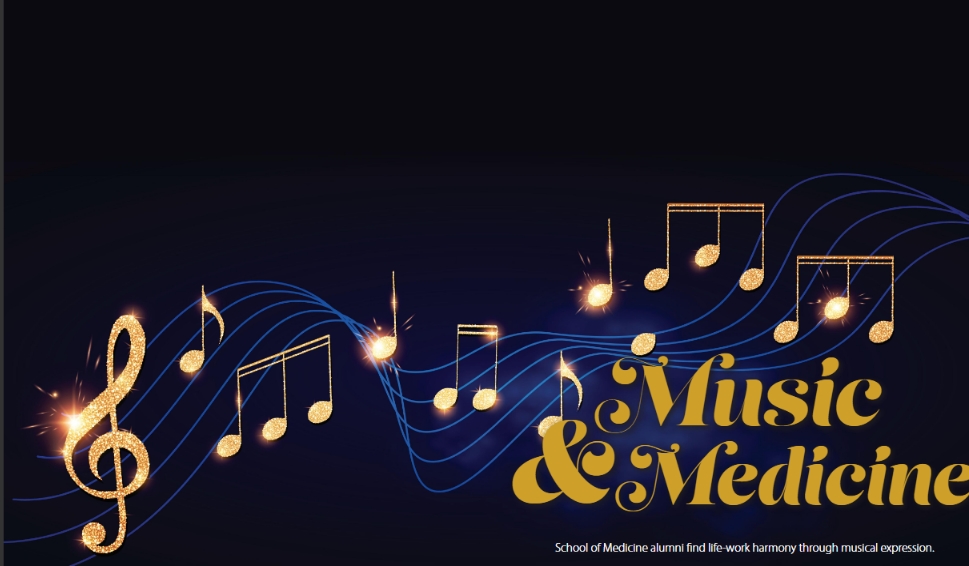
In the world of medicine, science reigns supreme. Some physicians also tap into the power of music. Several School of Medicine alumni are not only dedicated doctors but also accomplished musicians. These physician-musicians share stories of how their two passions intertwine, offering a deeper understanding of the therapeutic power of sound.
Before he was a doctor, Lee Mendenhall, MD (’20), was a grandson to a grandfather living with Alzheimer’s disease. Growing up in Wheeling, West Virginia, Dr. Mendenhall would often visit his grandfather to play piano to soothe the symptoms of the disease on a bad day.
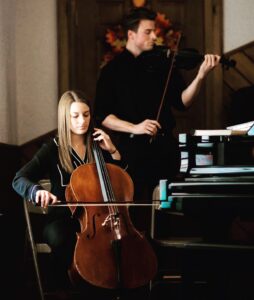
“When I would sit down and play the piano, he would change from being really ramped up to sitting with me for hours — not saying a peep, not getting angry, just sitting there relaxed,” said Dr. Mendenhall, now a practicing psychiatrist in Denver, Colorado. ” That would translate to the rest of the day.”
Dr. Mendenhall’s experience shows what studies since his childhood have indicated: there is strong evidence that music-based interventions may be helpful in everything from anxiety and depression to Parkinson’s disease and a variety of other conditions, according to the National Institutes of Health.
Dr. Mendenhall is among several Joan C. Edwards School of Medicine alumni for whom music is a vital tool in their professional and personal lives. “Music can heal as well as show our state of mind,” said Dr. Mendenhall, who plays viola and piano. “Music is something that has touched all of us, so it seems silly almost for it to not come up in the treatment room.”
For years, Dr. Mendenhall has participated in small music ensembles that visit adult care facilities, playing for residents to help ease their suffering.
“Music is a powerful form of healing,” he said. “I am lucky to share that with people.”
Jon Petersen, MD (’96), a native of Charleston, West Virginia, also came into music early in life, at the encouragement of his mother and father and inspired by his grandfather, who was a physician and a concert pianist. His grandfather housed the concert grand piano that famous pianists visiting Charleston used for their concerts.
Dr. Petersen loved music and piano competitions but was enticed to pursue medicine from the stories he heard from his grandfather.
After college, Dr. Petersen did not feel ready for the rigors of medical school. His sense of adventure led him to commission as an officer in the U.S. Air Force. While stationed in South Korea, he met a doctor who invited him to his clinic and inspired him to pursue his original dream of becoming a doctor.
Dr. Petersen was, at the time, in his 30s, married, with children — but with support from the School of Medicine staff and his family, he took the leap into medical school.
“Marshall gave me my chance, and I’ll always appreciate that,” Dr. Petersen said.
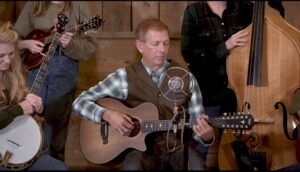
After graduating medical school, Dr. Petersen completed his family medicine residency at Eglin Air Force Base and became chief of medical staff for the Air Force Special Operations Command. He then completed his preventive medicine residency and master’s degree in public health at Johns Hopkins University. During his residency, Dr. Petersen began teaching music to his children: Katie, Ellen, Matt and Julianne. During a trip to the Gettysburg Battlefield, they stumbled upon a bluegrass festival and saw many families enjoying that style of music together. The rest is history for the family — now commonly known as The Petersens.
The Petersens have more than 838,000 subscribers to their YouTube channel with more than 250 million views. They have an even larger following across social media, where they post videos of their harmonies from their home base in Branson, Missouri.
With his children now grown and out of college, Dr. Petersen is still involved with the aviation community as an aviation medical examiner and flight instructor. He recently served as the chief medical officer for Bass Pro Shops. Dr. Petersen said music has been an important tool in binding his family, his faith and his medical practice.
Lucia Soltis, MD (’08), accompanied her mother to flute practice growing up in South Charleston, West Virginia.
“I always had a feeling that music is just something you do,’” said Dr. Soltis, a family medicine doctor based in Huntington.
Members of the West Virginia Symphony Orchestra played a small concert at her elementary school when Dr. Soltis was in the fourth grade, and it was obvious to her playing the violin was something she needed to do. By the time she graduated from South Charleston High School, she knew she also wanted to be a doctor.
“I was already telling people I was going to major in science and music when I got to college, and that I was also going to become a doctor,” Dr. Soltis said. “They looked at me like I was crazy.”
Dr. Soltis got a different look from the head of the biology department at Saint Vincent College in Latrobe, Pennsylvania, where she earned her undergraduate degree. She was already a music major, but she had to get his permission to double-major in biology.
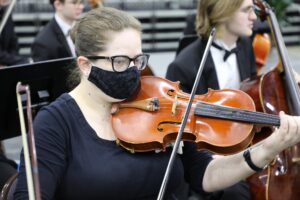
“He sat me down in his office and asked if I knew what I was doing, and I told him I was going to medical school,” she said. “He had received a flyer from a medical school that stated it was looking for music experience on applicant transcripts. He thought it was great that I was doing both.”
Dr. Soltis has played the viola with the Marshall University Symphony Orchestra for more than 10 years, and in 2016 she was selected to play with the World Doctors Orchestra, which played its concert in San Francisco that year.
The World Doctors Orchestra “combines the joy of great music with global medical responsibility,” performing concerts around the world and collecting donations for medical charities in the places it performs. While confident in her abilities as a doctor and musician for most of her life, Dr. Soltis said it was at that 2016 concert where she felt like she really found “her people.” She encourages other people to pursue their passions, saying that it will lead them to their own sense of acceptance.
“It really is cliché, but believe in yourself,” Dr. Soltis said. “If you are interested in something, then follow through. Pursue it. It doesn’t matter how weird or crazy it seems to others.”
Mathew “Mats” Lemberger, MD (’19), didn’t know his destiny when he picked up a guitar in his Long Island, New York, home when he was 12. Dr. Lemberger, who began practicing and teaching at Dartmouth University in September 2024 after completing the child and adolescent psychiatry fellowship program at the Joan C. Edwards School of Medicine, also didn’t know he wanted to be a doctor growing up, saying he looked to follow his North Star.
“The common thread for me was a desire to live a life where I would wake up every day and my purpose would be to reduce human suffering in a very direct way,” he said.
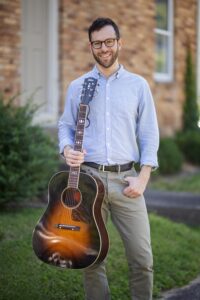
After earning a bachelor’s degree in English literature from Dartmouth, Dr. Lemberger spent the next year teaching English at an agricultural school in Greece. When he returned to the United States, he took an EMT training course that inspired him to pursue a career in medicine.
While he completed his fellowship in Huntington, Dr. Lemberger began recording an album, “Blue Notes from the Underground,” which he released earlier this year under the name Psych Flu. He describes the album as a tribute to ballads in the old-time American music tradition.
It was his experience in the Mountain State and Appalachia that helped Dr. Lemberger cultivate his medical roots and he said, and gave him the tools to reduce human suffering the way he always knew he wanted to.
“I’ll always look at Huntington in particular and Appalachia more broadly as a second home,” he said. “I just think of the sense of community, the genuine concern for your neighbor and the appreciation for life. … Ultimately, I believe I’m going to be a better doctor as a result of my journey at Marshall.”
